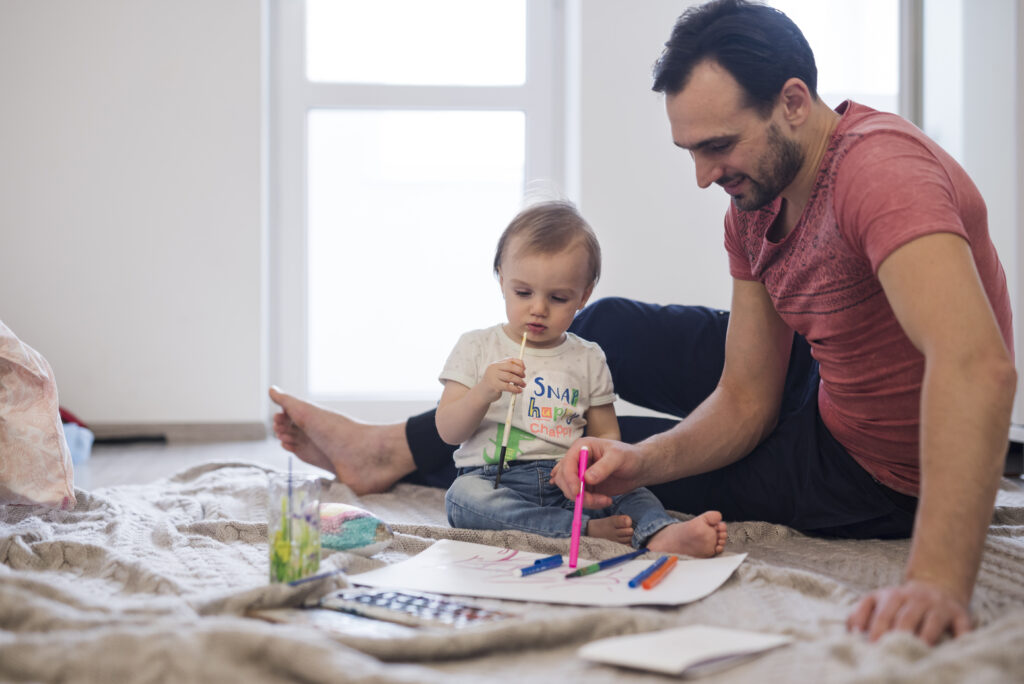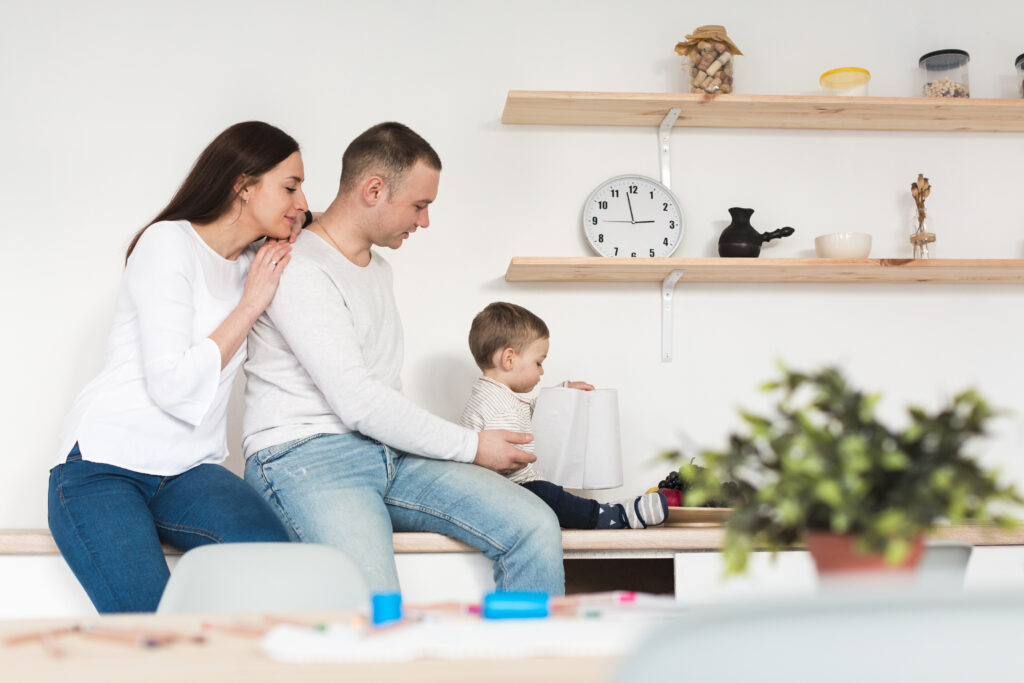Fatherhood Matters: The Crucial Role of Dads in Child Development

Fatherhood is not just about fulfilling a traditional role—it’s about shaping a child’s emotional and cognitive development in ways that are both profound and lasting. Studies have shown that the presence of a male role model, whether it’s a father or another nurturing male figure, has a positive impact on a child’s brain development. But what happens when a dad isn’t in the picture, and how can we create a fatherhood experience in different family dynamics, such as female-led relationships? The Impact of Fatherhood on Brain Development The involvement of a father or father figure in a child’s life offers unique contributions to their growth. Fathers often encourage more risk-taking and independence, fostering problem-solving skills and resilience. These experiences stimulate brain regions responsible for social behavior, cognitive flexibility, and emotional regulation. For instance, a father’s rough-and-tumble play helps children develop spatial awareness and emotional control, which are critical for brain development. Moreover, research indicates that children with an active male presence tend to perform better academically and have fewer behavioral problems. Their brains are wired to benefit from both maternal nurturing and the complementary parenting style that fathers often bring to the table, such as a balance of challenge and support. The Absence of a Father Figure When dads aren’t part of the equation, whether due to separation, loss, or other circumstances, children can still thrive with intentional parenting. However, the absence of a father figure can leave gaps in certain developmental areas. Research suggests that children growing up without male role models may face challenges with emotional regulation and social behavior. This doesn’t mean that children raised in single-mother households are at a disadvantage—it simply highlights the importance of ensuring a variety of nurturing relationships in a child’s life. In the absence of a father, extended family members, family friends, or mentors can step in to offer guidance, stability, and the encouragement that children need. Positive role models, both male and female, are crucial in creating a nurturing environment that supports a child’s holistic growth and family well-being. Fatherhood in Female-Led Relationships In female-led families, creating a fatherhood experience is about balancing different aspects of parenting to ensure children receive the benefits that both genders traditionally offer. This may involve including trusted male figures in the child’s life, such as uncles, grandfathers, or close family friends who can play a supportive, nurturing role. But just as important is recognizing that gender is not the only factor in successful parenting. Conscious parenting—where both parents work together to provide love, structure, and emotional intelligence—can replicate the dynamics traditionally associated with a father. Children can thrive in female-led households, particularly when their environment fosters open communication, emotional support, and diverse role models. Practical Tips for Enhancing Fatherhood Involvement Whether you’re a dad looking to deepen your relationship with your child or a mom in a single or same-gender household trying to ensure your child experiences the benefits of male role models, here are a few tips: Final Thoughts Fatherhood matters because it shapes the way children navigate the world—physically, emotionally, and cognitively. Whether a child is raised in a traditional household, by a single mom, or in a female-led family, the presence of nurturing and diverse role models plays an irreplaceable role in their development.If you’re looking for more insights on parenting, including tips on fostering healthy family dynamics and empowering your parenting journey, don’t forget to follow us on Instagram and YouTube. We offer valuable resources that will support you as you guide your child’s growth in today’s complex world.
Parenting Through Pain: Healing Yourself While Raising Your Children

Parenthood has a remarkable way of revealing past wounds we may not even realize we carry. It’s common for unresolved childhood trauma to resurface when we become parents ourselves, as interactions with our children can often trigger memories of pain and hardship. Understanding and processing these triggers is essential, not just for our personal healing, but for the well-being of our children. Parenting through pain is about recognizing the emotional scars we bring into our parenting journey and taking active steps to break the cycle. It’s about being mindful of our reactions, understanding why we feel triggered, and ensuring that our unresolved emotions don’t negatively affect our children’s development. Recognizing Triggers The first step in parenting through pain is learning to recognize your triggers. These are moments when your child’s behavior evokes strong emotional reactions that feel disproportionate to the situation at hand. For example, your child might have a meltdown over a minor issue, and you suddenly feel overwhelmed by anger or sadness. These emotions may stem from unresolved issues from your own childhood—perhaps feelings of being unheard, unsupported, or even abandoned. Acknowledging these triggers doesn’t mean blaming yourself for having them. In fact, becoming aware of them is a powerful first step toward healing. Conscious parenting teaches us to be fully present and to understand the motivations behind our behaviors, helping us to react in a way that fosters growth for both ourselves and our children. Why Triggers Happen Triggers often occur because our children’s experiences mirror situations from our own childhoods. When your child experiences a struggle or an emotion that resonates with your past, it can unconsciously bring up unresolved grief or trauma. For instance, if you grew up feeling neglected, your child’s need for constant attention might trigger feelings of frustration and inadequacy in yourself. In these moments, it’s crucial to pause and reflect on what’s truly happening. Are you reacting to your child’s behavior, or is your response influenced by unresolved pain from your own past? This self-awareness can help prevent emotional reactions from becoming harmful to your relationship with your child. Grieving With Your Kids One of the most powerful aspects of healing while parenting is learning how to grieve with your children. Parent-child bonding often deepens when you allow yourself to be vulnerable and share your emotions in an age-appropriate way. This doesn’t mean overwhelming your child with your trauma but rather modeling healthy emotional expression. For example, if you’ve had a difficult day and feel sadness or frustration bubbling up, it’s okay to say something like, “Mommy is feeling sad right now, but it’s okay. Everyone feels sad sometimes, and we can talk about it.” This not only shows your child that it’s normal to have big emotions but also that it’s healthy to talk about them. This kind of openness fosters emotional intelligence and helps your child learn to navigate their own feelings in a supportive environment. Tips for Healing While Parenting Final Thoughts Parenting through pain is challenging, but it also offers an incredible opportunity for growth. By understanding your triggers, grieving in healthy ways with your children, and practicing self-compassion, you’re not only healing yourself—you’re also modeling resilience and emotional intelligence for your children.If you’re looking for more tools and insights on this journey, don’t forget to follow us on Instagram and YouTube, where we share expert advice, practical tips, and resources to help you become the best parent you can be. Healing is a journey, but you don’t have to walk it alone. Together, we can foster healthier, more mindful parenting relationships that nurture both ourselves and our children.
Reorienting with Respectful Parenting: A Path to Connection and Harmony

Parenting can sometimes feel like an endless cycle of tantrums, arguments, and raised voices. It’s easy to get caught up in the whirlwind of emotions, leaving both parents and children feeling disconnected and frustrated. But what if there was a gentler, more intentional approach to breaking this cycle? Enter respectful parenting, a philosophy that emphasizes empathy, understanding, and connection without compromising structure or boundaries. What is Respectful Parenting? Respectful parenting is not about being permissive or letting children “get away” with everything. Instead, it’s about fostering a deep, mutual respect between you and your child. Unlike traditional authoritative approaches, respectful parenting encourages mindfulness and emotional intelligence, focusing on the child’s needs and emotions while guiding them through life’s challenges. At its core, respectful parenting emphasizes mindful parenting. By staying present in the moment, you become more aware of both your reactions and your child’s behaviors. This approach cultivates a stronger bond between parent and child, based on trust rather than fear or control. Respectful parenting is not a “hands-off” method; it’s a deeply intentional way of engaging with your child, allowing them the space to grow and develop while maintaining clear and compassionate boundaries. Breaking the Cycle of Tantrums and Yelling One of the most appealing aspects of respectful parenting is its ability to break the cycle of tantrums and yelling. If you’re stuck in a pattern of constant power struggles, reorienting yourself with respectful parenting can be a game-changer. Instead of reacting with frustration or anger, respectful parenting encourages you to take a step back and acknowledge your child’s feelings without judgment. Imagine this: Your toddler is in the middle of a meltdown because they can’t have a toy at the store. Instead of saying, “Stop crying! You’re not getting the toy,” a respectful parenting response might sound like, “I see you’re really upset because you want the toy, but we’re not buying it today.” By acknowledging their emotions, you validate your child’s experience, making them feel heard, which can often de-escalate the situation faster than demanding compliance. This is where parent-child bonding becomes crucial. When children feel that their emotions are respected and understood, they’re more likely to engage positively with you. This doesn’t mean you’re giving in to every whim; it means you’re nurturing their emotional intelligence while still maintaining your role as a guide. Respectful Parenting is Intentional Parenting Many parents fear that a more respectful approach will lead to permissiveness, where the child “rules” the household. However, respectful parenting and conscious parenting are deeply rooted in intentionality. It’s about making conscious decisions in how you interact with your child. You’re not just reacting to situations; you’re thinking ahead about the long-term goals of your parenting choices. For example, during family meetings, respectful parenting can help children feel included in decision-making processes. These meetings become a place where children can express their thoughts and feelings, fostering open communication. This sets a foundation for mutual respect that extends beyond the immediate moment. It’s about balancing empathy with limits—helping your child understand their boundaries in a loving, supportive way. Using Respectful Parenting in Everyday Life The principles of respectful parenting can be applied in daily routines, from managing bedtime routines to navigating sibling conflicts. By engaging in activities for toddlers that encourage cooperative play, you allow your child to learn important social skills in a low-pressure environment. These activities not only build confidence but also reinforce the value of working together and respecting others’ boundaries. Online resources and child development classes can also be incredibly useful for parents wanting to dive deeper into respectful parenting. Many of these programs offer guidance on how to implement mindful practices in a way that fits the busy American lifestyle. The Role of Social Media in Spreading Respectful Parenting We live in a digital age, and social media has become an important tool for connecting with other like-minded parents. Following parenting experts on platforms like Instagram and YouTube can provide valuable daily inspiration and tips. For instance, our website’s Instagram page is filled with real-life examples of respectful parenting in action, offering practical solutions for common challenges like bedtime battles, mealtime struggles, and sibling rivalry. Meanwhile, our YouTube channel features in-depth tutorials and interviews with child development specialists, providing parents with a rich, visual learning experience. These social media pages serve as a supportive community where you can connect with other parents, share stories, and get advice on implementing respectful parenting in your own home. Start Your Journey Today! Respectful parenting is more than a method—it’s a mindset shift that helps break the cycles of frustration and disconnection. It’s about fostering an environment where both parents and children can thrive emotionally and mentally, developing stronger, healthier relationships in the process. Whether you’re just beginning to explore conscious co-parenting or looking to integrate more family well-being practices into your home, respectful parenting offers a roadmap to success.Ready to take the next step? Visit our website to learn more, and don’t forget to follow us on Instagram and YouTube for ongoing tips, tools, and insights that will empower your parenting journey. Let’s transform the way we parent—together.

